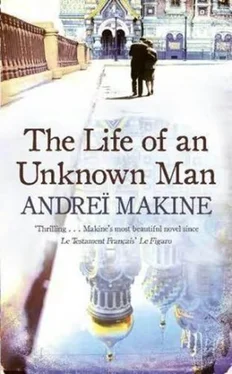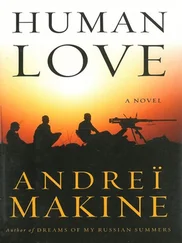Andreï Makine - The Life of an Unknown Man
Здесь есть возможность читать онлайн «Andreï Makine - The Life of an Unknown Man» весь текст электронной книги совершенно бесплатно (целиком полную версию без сокращений). В некоторых случаях можно слушать аудио, скачать через торрент в формате fb2 и присутствует краткое содержание. Жанр: Современная проза, на английском языке. Описание произведения, (предисловие) а так же отзывы посетителей доступны на портале библиотеки ЛибКат.
- Название:The Life of an Unknown Man
- Автор:
- Жанр:
- Год:неизвестен
- ISBN:нет данных
- Рейтинг книги:3 / 5. Голосов: 1
-
Избранное:Добавить в избранное
- Отзывы:
-
Ваша оценка:
- 60
- 1
- 2
- 3
- 4
- 5
The Life of an Unknown Man: краткое содержание, описание и аннотация
Предлагаем к чтению аннотацию, описание, краткое содержание или предисловие (зависит от того, что написал сам автор книги «The Life of an Unknown Man»). Если вы не нашли необходимую информацию о книге — напишите в комментариях, мы постараемся отыскать её.
The Life of an Unknown Man — читать онлайн бесплатно полную книгу (весь текст) целиком
Ниже представлен текст книги, разбитый по страницам. Система сохранения места последней прочитанной страницы, позволяет с удобством читать онлайн бесплатно книгу «The Life of an Unknown Man», без необходимости каждый раз заново искать на чём Вы остановились. Поставьте закладку, и сможете в любой момент перейти на страницу, на которой закончили чтение.
Интервал:
Закладка:
The mask wavers and at once closes up again, retreats into its solitude. The show goes on. The ladies in crinolines pass through the galleries at the Hermitage. Fireworks at the Peterhof. Putin shakes Paul McCartney’s hand after a performance in Moscow on Red Square. “Your songs, Paul, have always been a breath of freedom for us…”
Absurdity has reached its limits, thinks Shutov. He again hits upon the program about the lives of the new rich and no longer takes the trouble to switch channels. The two presenters are visiting a model house on an estate under construction close to Saint Petersburg. “High security,” “luxury homes,” “top-quality materials”… Language evocative of this grotesque social climbing, higher, ever higher, toward the best place in the sun.
Shutov begins to doze off. This paradise from which simple mortals are excluded is less outrageous than dogs lapping up caviar. Villas crammed with electronics, but, after all, the rich have to live somewhere. Each dwelling will have a name, there will be an “Excelsior,” a “Capitol”… The two presenters emerge from “Buckingham” and set about describing the beauties of gardens in the English style… “And in the greenhouses, you’ll be harvesting pineapples and guavas…”
“That’s exactly the place where we were fighting to the death. For the motherland, as we used to say in those days…”
Shutov gives a start, the remark is too unusual to have come from the mouth of one of the presenters. Besides, they are still singing the praises of the gardens. He looks at the old man. The same mask, the same calm eyes. Suddenly his lips move: “Yes, there. That river, the Lukhta. They had to cross it under heavy fire…”
Shutov is speechless, turning over in his mind what he has just heard: “We were fighting… for the motherland.” The words came out with no rhetorical flourish, there was even an ironic hesitation, acknowledging the naïveté of the time-honored expression. But that last remark, which he saw forming on the old man’s lips, was neutral, the name of a river, a topographical fact. Shutov clears his throat and speaks as if he were the one recovering the power of speech: “Forgive me… I… I thought… Well, in fact, they told me you couldn’t…” The old man turns his head, changes his position to look at Shutov. “Yes, they told me that you were… That you had lost… er… the power of speech.”
The old man smiles.
“You can see that’s not so.”
“But, then, why… have you never spoken to anyone?”
“Spoken about what?”
“I don’t know… Life… Yes, this new life.”
And this, too!
On the screen a kennel can be seen adjoining the model house, the presenter is explaining about the air-conditioning system, as a large white greyhound rubs against his leg.
“Well, what’s to be said about it? Everything’s clear these days.”
He falls silent and Shutov is gripped by an irrational fear: what if the old man should relapse into terminal mutism! The program shows workmen felling a tree: the shrill whine of the trunk being sawn, the crash of the branches.
“Yes. That’s where we were fighting. And with no help from any icons either… Let me introduce myself. The name’s Volsky, Georgy Lvovich.”
III

On June 21, 1941, at the Nord Café, which was very popular with the people of Leningrad, Volsky lived through the last hours of his old life, the last day of peace, without knowing it. A moment of bliss, epitomized by the taste of a cup of hot chocolate.
A young woman with dark-brown hair had joined this group of friends who, like him, were students at the Conservatory. She was eating a pastry, a trace of cream remained on her lips, a mustache that made everyone laugh… Volsky spoke to her, their conversation became detached from the hubbub in the room. He lived in the same district as she and it pleased him greatly to remark, “It’s a small world and yet we’ve never met before…” Simple words that helped him to grasp with fresh intensity what he had become. From being a penniless provincial he had been transformed into a young singer, speaking on equal terms to a young woman of good family from Leningrad. They agreed to meet again, a hint of a reunion that promised a glorious day very soon.
This was the moment when the taste of hot chocolate became associated with the future life he dreamed of. A peasant’s son, he had managed, not without some gritting of teeth, to win recognition for his talent, to gain acceptance, armed only with his voice. His future was like the overture to an opera, he often pictured himself at the Kirov Theater, in Rigoletto or Boris Godunov.
From his childhood he retained the memory of those hands, his father’s and mother’s, lined palms, encrusted with earth. His arrival in Leningrad had wrenched him away from the gravitational pull of his origins, liberating his footsteps from the mud of country roads, allowing him to run, to escape… He would live in the weightlessness of song, he thought. Just as others lived from the harsh weight of physical labor. He was sufficiently pleased with himself to justify this dispensation and to declare himself the winner. A conqueror who would collude with the proudest city in Russia, and win acclaim from beautiful women with eyes that shone in the darkness of boxes at the theater.
Such thoughts were mingled that evening with the clear light of a late sunset, the laughter of his friends in the café’s great hall, and the taste of hot chocolate drunk in little sips.
The next day the loudspeaker attached to a post opposite the Nord Café was to announce the start of the war. As did thousands of other loudspeakers from the Black Sea to the Pacific.
In the very same street in September he saw an apartment building whose front had just been ripped out by bombing. The insides of the dwellings, almost undamaged, astonished him more than the totally demolished buildings, already numerous in the besieged city. In an armchair at the far end of a room on the second floor Volsky could make out a body, a motionless face… He hastened to think back to that evening of June 21, the taste of hot chocolate.
The same memory returned one morning in October: a woman slipped over on the frozen bank of the Neva and he rushed to her aid, caught the bucket she was trying to fill. In the apartments the water had been cut off for weeks but this was when he became aware of the strangeness of the situation. A modern metropolis in which people drew water from the river and drank the murky liquid. He thought again about that cup of hot chocolate.
He recalled it, too, that night when, in the entrance hall to his apartment building, he heard a child’s voice, a whine similar to the groaning of a drunkard. He climbed the staircase, feeling his way, accustomed to living without electricity, and the moaning came closer, now forming into words, then stopped all at once. He struck a match (a priceless treasure) and saw, at his feet, an old man’s head upon the slender body of a little boy. The flame went out, he gave a call at the doorway to an apartment. A rustling could be heard, no voice. “Wait here,” he said to the child, invisible in the darkness. “I’ll come back. I’ll give you something to eat.” He brought what people fed on in the besieged city: a slab of bread made partly from straw. A burning block of wood from the floor served as a torch to light his path. The child was no longer there. The door to one of the apartments remained open. Volsky peered in and gave a shout, but did not have the courage to venture into the cold caverns of the rooms…
Back at his own place, he devoured the bread as if someone had tried to snatch it from him. Then remained for a long while in the darkness, picturing the child in a labyrinth of rooms where it had become possible to come across a corpse. Now he grasped that it was not hunger driving him to return to the night of June 21 and his cup of hot chocolate. It was distress, rather, at seeing how the city’s death throes were becoming routine. And how he was quickly slipping into a way of life where one went to sleep at night without worrying about a starving child dying in a neighboring apartment…
Читать дальшеИнтервал:
Закладка:
Похожие книги на «The Life of an Unknown Man»
Представляем Вашему вниманию похожие книги на «The Life of an Unknown Man» списком для выбора. Мы отобрали схожую по названию и смыслу литературу в надежде предоставить читателям больше вариантов отыскать новые, интересные, ещё непрочитанные произведения.
Обсуждение, отзывы о книге «The Life of an Unknown Man» и просто собственные мнения читателей. Оставьте ваши комментарии, напишите, что Вы думаете о произведении, его смысле или главных героях. Укажите что конкретно понравилось, а что нет, и почему Вы так считаете.









